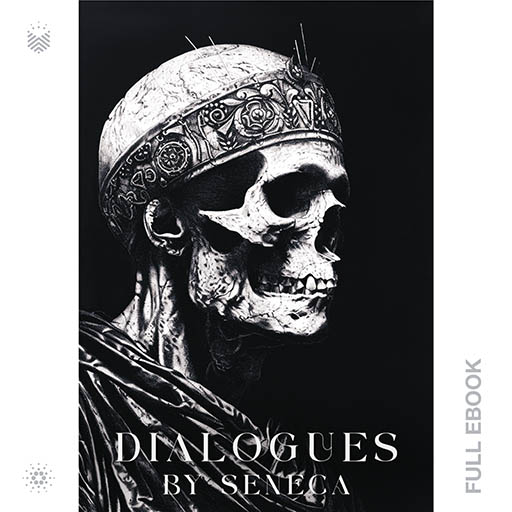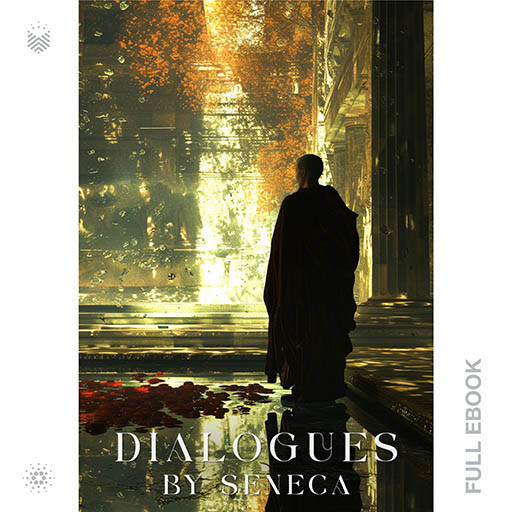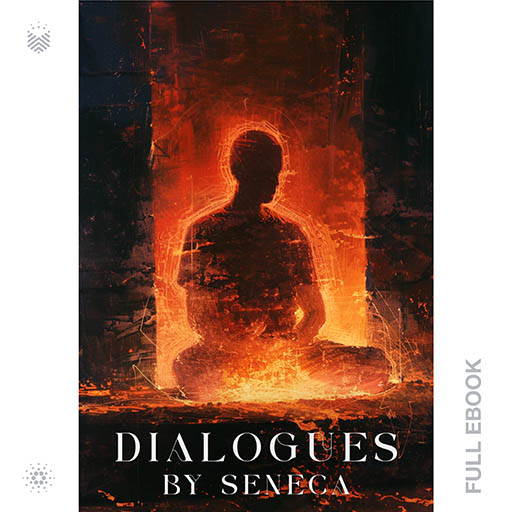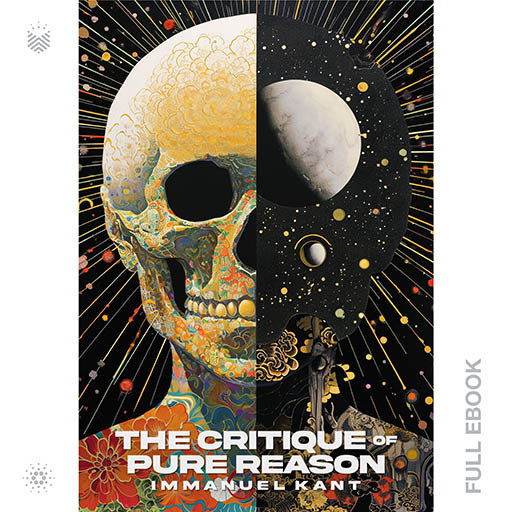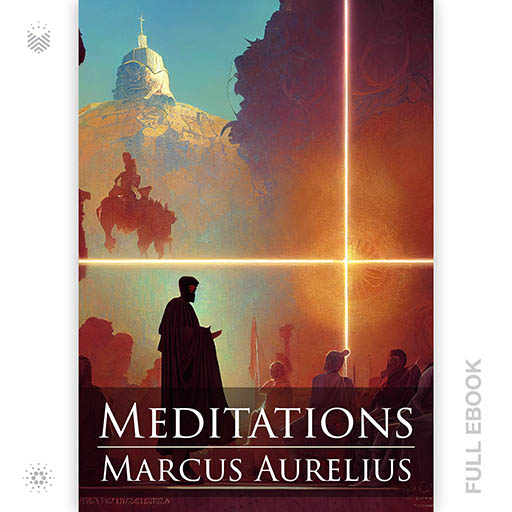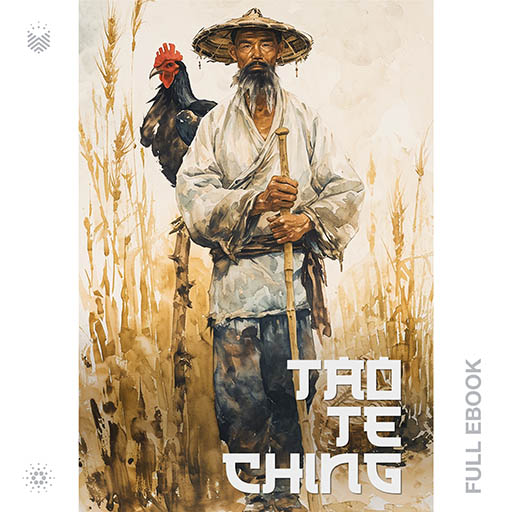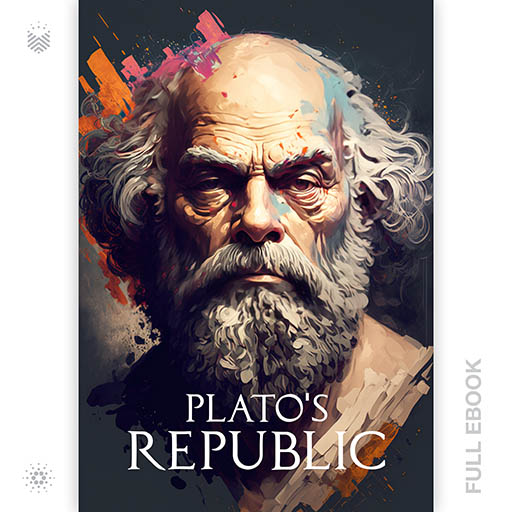Dialogues
Sold Out - Available On:
jpg.storeSeneca’s “Dialogues” encompass diverse letters and essays, delving into a broad spectrum of philosophical themes and offering practical guidance for embracing Stoic principles in daily living.
Description
Here are some of Seneca’s notable works:
- Letters to Lucilius (Epistulae Morales ad Lucilium):
- A collection of 124 letters written by Seneca to his friend Lucilius. These letters cover a wide range of philosophical topics and practical advice on how to live a Stoic life. They are written in the form of a dialogue and address issues such as virtue, the nature of the gods, and the proper approach to wealth and power.
- On Anger (De Ira):
- A treatise in three books in which Seneca examines the nature and dangers of anger. He discusses the destructive effects of anger on individuals and society and provides advice on how to control and overcome this powerful emotion.
- On the Shortness of Life (De Brevitate Vitae):
- An essay that reflects on the brevity of human life and the need to use time wisely. Seneca emphasizes the importance of focusing on what truly matters and living in accordance with one’s values.
- On the Happy Life (De Vita Beata):
- An essay exploring the nature of happiness and the path to a fulfilled life. Seneca discusses the Stoic view on the sources of true happiness and the role of virtue in achieving a contented and meaningful existence.
- On Leisure (De Otio):
- Seneca explores the concept of leisure and how it can be used for personal development and philosophical reflection. He contrasts productive and unproductive leisure, advocating for activities that contribute to moral and intellectual growth.
- Consolation to Helvia (Consolatio ad Helviam Matrem):
- A letter of consolation written to Seneca’s mother, Helvia, during a period of exile. In it, Seneca reflects on the nature of adversity and provides comfort and Stoic wisdom to his mother.
These works collectively offer a comprehensive view of Seneca’s Stoic philosophy, addressing both theoretical aspects of ethics and practical guidance for daily living. Reading Seneca’s letters, essays, and dialogues provides valuable insights into the Stoic perspective on virtue, reason, and the pursuit of a virtuous life.
Numbered eBooks: 250
Number of Unique Covers: 16
Number of 1:1 Covers: 10
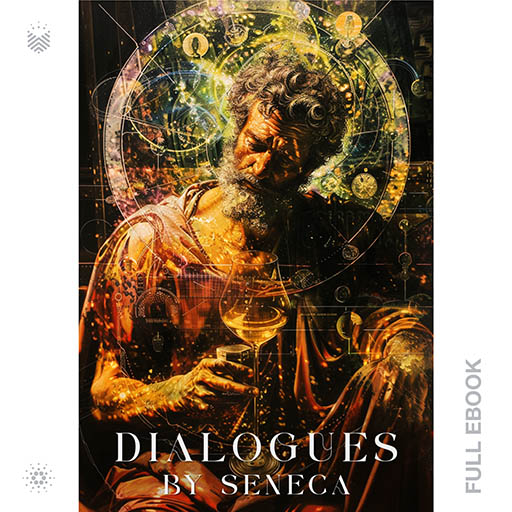
Seneca
1 Unique Designs
x 70 Numbered eBooks
= 70 NFT eBooks
eBook Numbers 180 - 249
(28.00% of Supply)
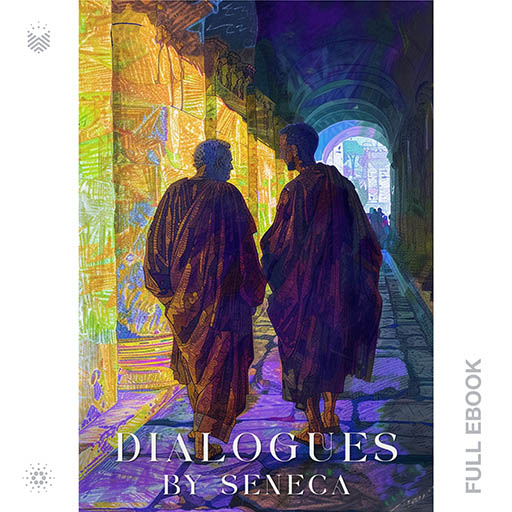
Dialogues with Friends
1 Unique Designs
x 60 Numbered eBooks
= 60 NFT eBooks
eBook Numbers 120 - 179
(24.00% of Supply)
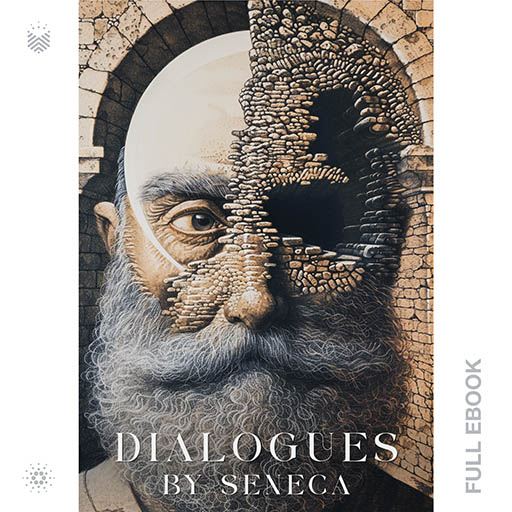
Stoic Figure
1 Unique Designs
x 50 Numbered eBooks
= 50 NFT eBooks
eBook Numbers 70 - 119
(20.00% of Supply)
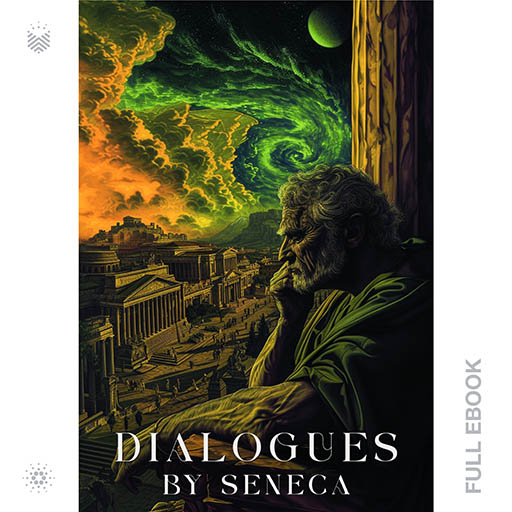
Philosophical Legacy
1 Unique Designs
x 30 Numbered eBooks
= 30 NFT eBooks
eBook Numbers 40 - 69
(12.00% of Supply)

Sage
1 Unique Designs
x 20 Numbered eBooks
= 20 NFT eBooks
eBook Numbers 20 - 39
(8.00% of Supply)
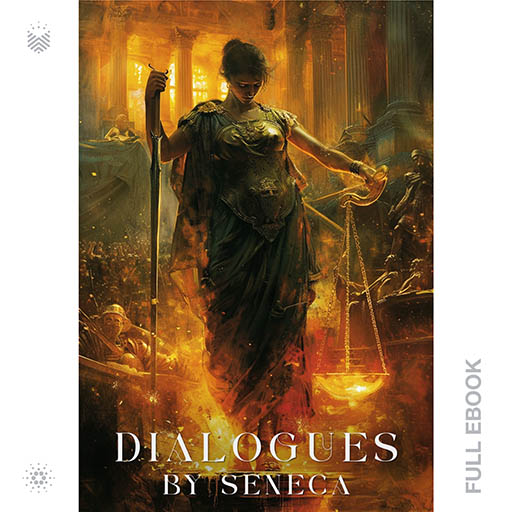
Fairness and Justice
1 Unique Designs
x 10 Numbered eBooks
= 10 NFT eBooks
eBook Numbers 10 - 19
(4.00% of Supply)
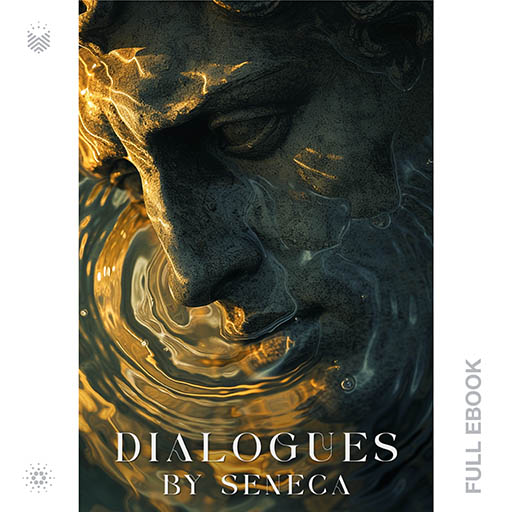
The Inner Reflection
4 Unique Designs
x 1 Numbered eBooks
= 4 NFT eBooks
eBook Numbers 6 - 9
(1.60% of Supply)
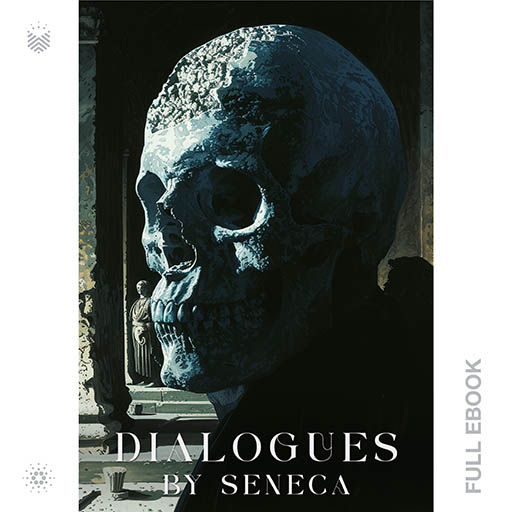
Death is Natural
3 Unique Designs
x 1 Numbered eBooks
= 3 NFT eBooks
eBook Numbers 3 - 5
(1.20% of Supply)
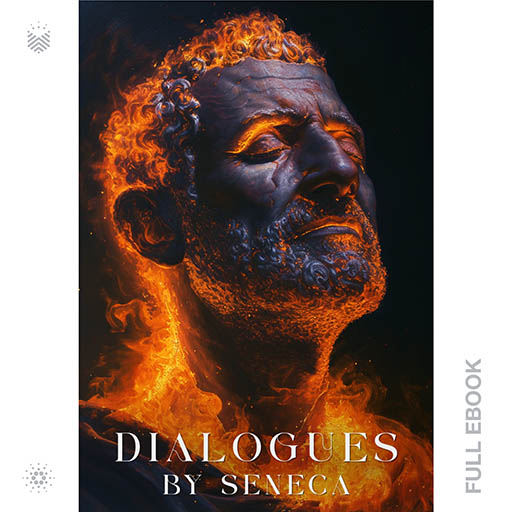
The Resilience
2 Unique Designs
x 1 Numbered eBooks
= 2 NFT eBooks
eBook Numbers 1 - 2
(0.80% of Supply)
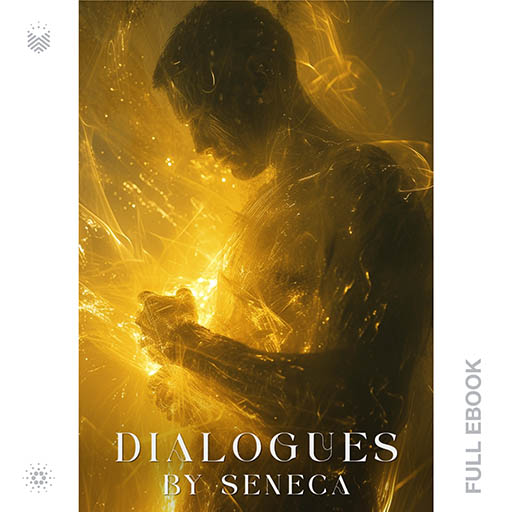
The Emotional Control
1 Unique Designs
x 1 Numbered eBooks
= 1 NFT eBooks
eBook Numbers 0 - 0
(0.40% of Supply)
Details
Publisher : Book.io
Series : Monday Meditations 2.0
First Publication Date : AD 64
Author : Seneca
Genres: Essays, History, Non-Fiction, Philosophy, Self-help
Language : English
Word Count : 220,000
Format : DEA (Decentralized Encrypted Asset)
Read On : Book.io eReader dApp
Cover Art : Includes 4K hi-resolution book cover
Cardano Retail Price : 299 ADA
Cardano Discount Price : 149 ADA, for wallet holding Meditations and The Critique of Pure Reason
Purchase Limit: 1
Cardano Policy ID : ee41c5c39cdf530aa22c2a7705d44703eb9055a8c9d1c4e17931c8da
Author Info
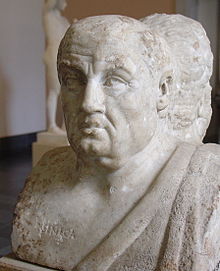
Seneca
Seneca, full name Lucius Annaeus Seneca, was a prominent Roman Stoic philosopher, statesman, and playwright who lived from around 4 BCE to 65 CE. He is often referred to as Seneca the Younger to distinguish him from his father, Seneca the Elder. He was a leading figure in the Stoic school of philosophy, which emphasized the importance of virtue, reason, and self-control in achieving a tranquil and contented life. His writings, including letters, essays, and dialogues, explore Stoic principles an… Read More
You might also like
by Immanuel Kant
“The Critique of Pure Reason” is a philosophical work by Immanuel Kant, first published in 1781. It is one of Kant’s major works and is considered a cornerstone in modern Western philosophy. The book addresses fundamental questions about human knowledge, metaphysics, and the nature of reality.
Read More
by Marcus Aurelius
A special edition release only for cNFTCon attendees. Meditations is a series of personal writings by Marcus Aurelius, Roman Emperor from AD 161 to 180, recording his private notes to himself and ideas on Stoic philosophy.
Read More
by Laozi
The “Tao Te Ching” is a foundational text in Taoism, an ancient Chinese philosophical and religious tradition, written around 400 BC.
It is a collection of 81 short chapters, each containing poetic and philosophical verses. The text explores the concept of the Tao (Dao), which can be translated as the “Way” or the “Path.” The Tao represents the fundamental and unnameable force that underlies and unifies the universe.
… Read More
by Plato
“The Republic” is a philosophical dialogue written by the ancient Greek philosopher Plato. It is one of his best-known works and is widely considered a classic of Western philosophy. In the dialogue, Plato explores the nature of justice and the ideal state through a discussion between Socrates and several other characters.
Read More

